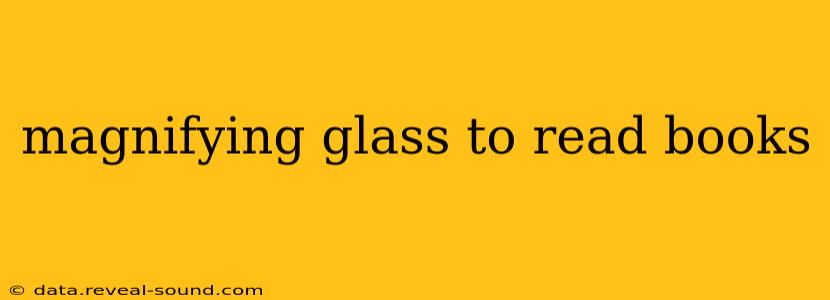Reading is a cherished pastime for many, but as we age, the print on the page can become increasingly difficult to decipher. This is where a magnifying glass for reading books becomes an invaluable tool, allowing readers to continue enjoying their favorite novels, textbooks, or newspapers with clarity and ease. This guide will explore the various types of magnifying glasses, their features, and how to choose the right one for your specific needs.
What are the different types of magnifying glasses for reading?
Several types of magnifying glasses cater to different reading preferences and needs. These include:
-
Handheld Magnifiers: These are the most common type, offering portability and ease of use. They range from simple, inexpensive lenses to more sophisticated models with features like LED lighting and ergonomic handles. The magnification power varies considerably, so choose one that suits your vision needs.
-
Stand Magnifiers: These offer hands-free reading, ideal for extended reading sessions. They typically have a larger lens and a stand to hold the magnifier above the book. Some models include features like adjustable height and angle.
-
Illuminated Magnifiers: These incorporate LED lights to enhance visibility, particularly beneficial in low-light conditions. The illumination improves contrast and reduces eye strain.
-
Page Magnifiers: Designed for placing directly onto the page, these magnifiers often feature a large lens area covering a substantial portion of a page. This minimizes the need for constant repositioning.
-
Head-worn Magnifiers: These magnifiers are worn like eyeglasses and offer a hands-free, convenient option. They are particularly helpful for people with limited dexterity.
What magnification level should I choose?
Choosing the right magnification level is crucial. Magnification is expressed as "X," where a higher number indicates greater magnification. For example, a 3X magnifier magnifies the object three times its original size.
- Low magnification (2X-3X): Suitable for individuals with mild vision impairment or for reading relatively large print.
- Medium magnification (3X-5X): A good option for reading standard-sized print.
- High magnification (5X and above): Ideal for reading very small print or for those with significant vision impairment. However, a higher magnification often means a smaller field of view.
It's advisable to consult an eye care professional to determine the optimal magnification level for your specific needs.
How do I choose a magnifying glass for my needs?
Consider the following factors when selecting a magnifying glass for reading books:
- Magnification Power: As discussed above, this is crucial and depends on your vision needs.
- Lens Size: A larger lens provides a wider field of view, reducing the need for frequent repositioning.
- Weight and Ergonomics: Choose a magnifier that is comfortable to hold and use for extended periods.
- Lighting: Illuminated magnifiers are advantageous for reading in low-light conditions.
- Portability: Handheld magnifiers are the most portable, while stand magnifiers offer greater stability.
What are the benefits of using a magnifying glass for reading?
Using a magnifying glass for reading offers several benefits:
- Reduced Eye Strain: Enhances clarity and reduces the effort your eyes need to exert.
- Improved Reading Comfort: Makes reading more enjoyable and less tiring.
- Increased Accessibility: Allows individuals with visual impairments to continue enjoying reading.
- Protection from Headaches: Reduces the strain associated with straining to see small print.
Are there any downsides to using a magnifying glass for reading?
While magnifying glasses offer many advantages, some potential drawbacks exist:
- Limited Field of View: Higher magnification typically leads to a smaller field of view.
- Distortion: Low-quality lenses may cause some distortion at the edges.
- Cost: High-quality magnifiers can be more expensive.
What are the best magnifying glasses for reading books?
Numerous reputable brands offer high-quality magnifying glasses. However, the best choice depends on individual needs and preferences. Researching customer reviews and comparing features from different manufacturers will help find the ideal solution.
Can I use a magnifying glass for reading digital books on a tablet?
While designed primarily for physical books, some magnifiers can be used with digital devices. However, the glare from the screen might reduce the effectiveness of the magnification. Using a screen protector with anti-glare properties may help.
This comprehensive guide provides insights into choosing and using a magnifying glass for reading. Remember to prioritize comfort and clarity when selecting the right magnifier to enhance your reading experience.
